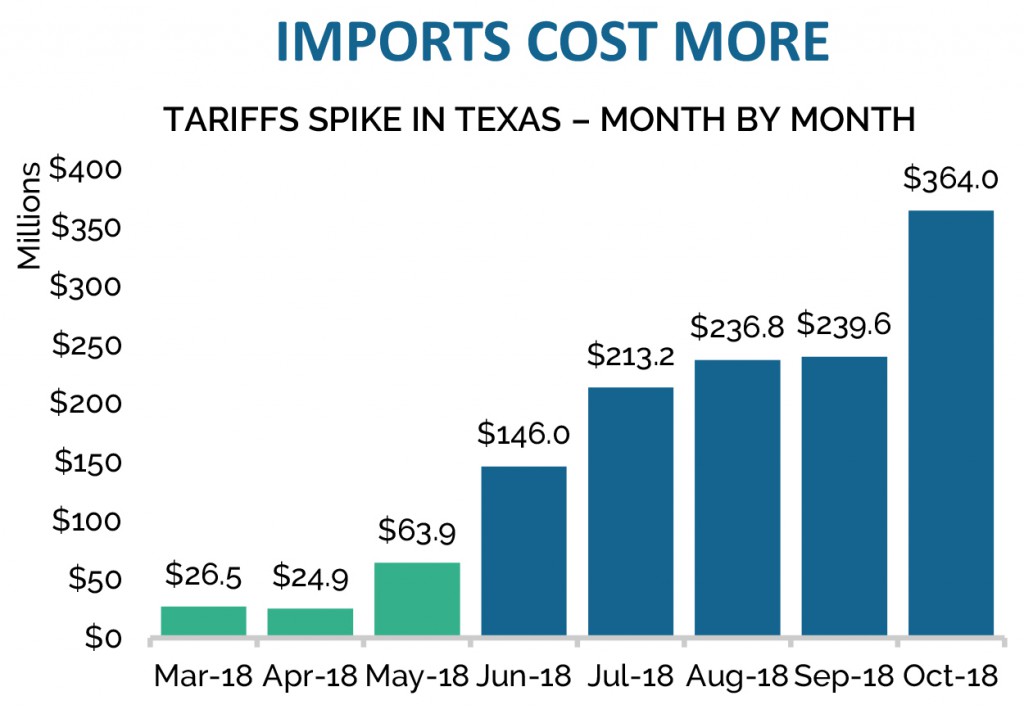Most recent monthly data shows Texas businesses have paid $364 million in tariffs on products subject to new Trump tariffs; more than 12 times what was paid on the same products last year
Tariffs have a direct impact on Southeast Texas: Port of Houston exports subject to retaliatory tariffs are down 47 percent in most recent month; exports not subject to retaliation rose 34 percent
Record-high tariffs have now cost Texas more than a billion dollars, according to new data released today at a trade town hall meeting in Houston. The data was released by Tariffs Hurt the Heartland—a nationwide grassroots campaign against tariffs— and compiled by the Trade Partnership, and includes the first look at the full weight of tariffs that have been imposed on $200 billion in Chinese imports and the resulting retaliatory actions against American exports. Texas businesses have now paid an extra $1.1 billion in additional tariffs, including $364 million in October, the most recent month for which data is available. During that month, Texas businesses paid more than 12 times the tariffs they paid on the same products at the same time last year.
“Retailers rely on imported merchandise to provide American families products they need at prices they can afford,” said Texas Retailers Association President & CEO George Kelemen. “From clothing to electronics, many consumer products are no longer mass-produced in the United States. Because of the trade war with China, local businesses are already feeling the impact of the tariffs. Faced with limited resources, small retailers have less control over their supply chains and cannot absorb higher costs from tariffs.”
The record-setting Texas numbers correspond with new national data showing American businesses paid $6.2 billion in tariffs in October, the highest amount for any month in U.S. history.
See the Texas State Impact Report for more information.
At a town hall meeting at the Petroleum Club of Houston, business owners, manufacturers, energy leaders and trade experts discussed the cost of tariffs for Texas businesses, workers and families, and called for a change in course for the country’s trade policy.
“The goal of the industry and policymakers should always be to keep high quality domestic manufacturing here in the United States, and PESA is very concerned that despite the best intentions, section 232 and 301 tariffs may have the opposite effect in relation to many areas of the energy industry,” said Petroleum Equipment & Services Association Vice President of Government Affairs Tim Tarpley.
“Agriculture has been struggling for some time now. Net farm income has declined by more than half in the last five years,” said Texas Farm Bureau President, Russell Boening. “Against that economic backdrop, this trade war could not have come at a worse time. The Trump Administration assisted farmers with transition payments. That too, is appreciated, but it is no solution for the long term. Nothing can replace free and fair trade in agriculture’s economic equation.”
Though tariffs are billed by the administration as a way to reduce the trade deficit, export numbers reveal that the opposite is happening. Since the trade war began, Texas exports have faced $381 million in new retaliatory tariffs, including $107 million in October. As a result, Texas exports subject to retaliation have dropped 41 percent. Southeast Texas has been hit particularly hard by retaliatory tariffs, with Port of Houston exports subject to retaliatory tariffs dropping by 47 percent. Port exports not subject to retaliatory tariffs rose by 34 percent.
“Texas businesses are witnessing significant drops in exports as a result of the tariffs. These American businesses, farmers and financial markets are all reeling from these tariffs. Ending the trade war is essential to keeping America competitive in the global marketplace while growing our economy and the millions of jobs supported by trade here at home,” said Former Louisiana Congressman and Tariffs Hurt the Heartland spokesperson Charles Boustany (R –La.-3).
Part of a larger series, the data released today is the latest segment of the monthly Tariff Tracker that Tariffs Hurt the Heartland has launched in conjunction with The Trade Partnership, who compiles monthly data released by the U.S. government. The monthly import data is calculated using data from the Census Bureau, and the monthly export data is compiled based on Census Bureau and U.S. Department of Agriculture data. As part of the Tariff Tracker project, Tariffs Hurt the Heartland is releasing data on how individual states have been impacted by increased import tariffs and declining exports.
Tariffs Hurt the Heartland is the nationwide, non-partisan campaign opposing tariffs that is supported by more than 150 trade associations from every industry. Tariffs Hurt the Heartland has been holding town hall meetings on the tariff impact of tariffs in communities across the country. The campaign is also airing ads across 11 states in the Midwest that describe the impact of tariff increases on consumers and has launched an interactive map tracking the tariff impact on American employers.





